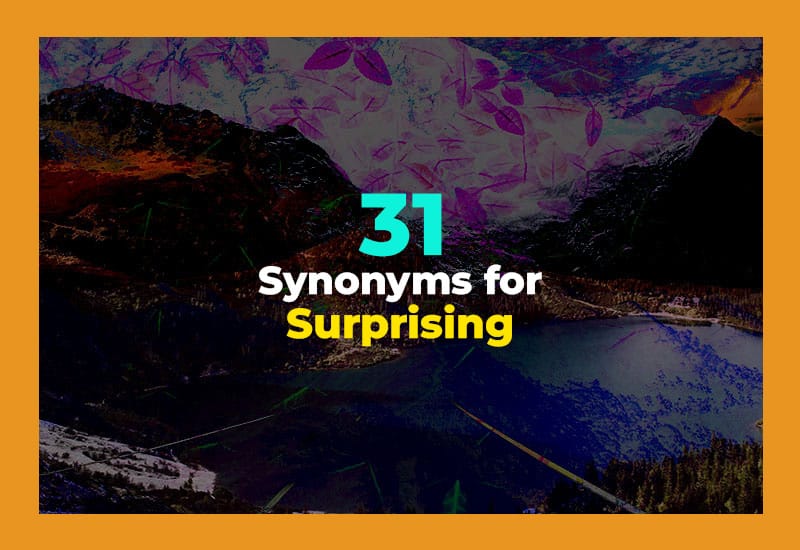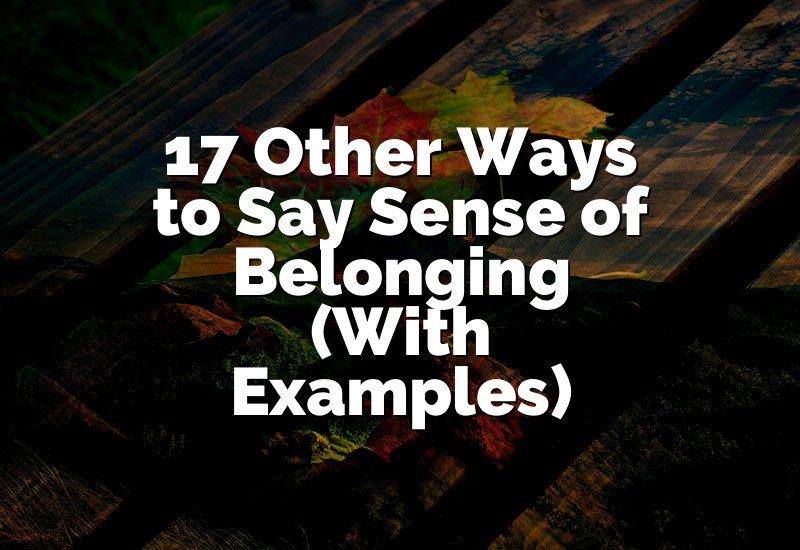Have you ever seen something really amazing or shocking and thought, "Wow, I did not expect that!"? Life is full of surprising moments, astonishing events, and jaw-dropping experiences. From sudden news to unexpected gifts, there are so many ways to feel amazed. Let's explore 31 easy synonyms for surprising with simple examples to help you use them in everyday conversations.
1. Astonishing
Astonishing means something is so amazing or shocking that it makes you stop and notice. It is stronger than just surprising. For example, "It was astonishing to see the rainbow after the storm," and "Her performance was astonishing and left everyone speechless." Astonishing can describe anything that catches you off guard in a very strong way. When you say something is astonishing, it shows a mix of shock and admiration. People use this word to express excitement or amazement about events or achievements that are really impressive.
2. Amazing
Amazing means something is very good or surprising in a wonderful way. It makes you feel wow. For example, "The magician's trick was amazing," and "It's amazing how fast she learned the new skill." Amazing is an easy word to use and shows happiness and surprise at the same time. When you find something amazing, it makes you feel excited or impressed. People often use amazing for experiences, views, or actions that are very impressive and unexpected. It is a friendly, casual word for surprising moments.
3. Stunning
Stunning means something is so beautiful or shocking that it makes you amazed. For example, "The sunset over the mountains was stunning," and "She looked stunning in her new dress." Stunning can describe both beauty and surprising events. It gives a feeling of awe and excitement. When something is stunning, it captures attention immediately. People often use stunning for moments, views, or appearances that are unexpectedly impressive or wonderful. It is a simple word to show surprise in a positive way.
4. Shocking
Shocking means something is very surprising in a way that is hard to believe. For example, "The news of his sudden move was shocking," and "It was shocking to see the broken statue." Shocking can be used for bad or unexpected events. It gives a strong feeling of surprise, sometimes with disbelief. When people say something is shocking, it shows a strong reaction. This word is easy to use when talking about events or news that make people react immediately because they did not expect it.
5. Unexpected
Unexpected means something happens without warning or planning. It catches you off guard. For example, "It was unexpected to see her at the party," and "The rain was unexpected but refreshing." Unexpected is an easy word to use for events that surprise you. It shows that something happened in a way you did not predict. People use unexpected for both good and bad situations. When you say something is unexpected, it makes it clear that it was not planned and made you feel surprised naturally.
6. Startling
Startling means something surprises you suddenly and strongly. It often makes you jump or react quickly. For example, "The loud noise was startling," and "It was startling to see the tiger so close." Startling is used for sudden surprises that catch your attention immediately. It shows a mix of shock and alertness. People use startling for events or moments that are surprising in a quick, strong way. It is a simple word to explain sudden surprises that make you feel alert or amazed at the same time.
7. Remarkable
Remarkable means something is so unusual or special that it deserves attention. For example, "Her skill in painting is remarkable," and "It was remarkable how fast he solved the problem." Remarkable shows a positive and impressive kind of surprise. People use remarkable for achievements, qualities, or events that are very good and unexpected. When you say something is remarkable, it makes it clear that it is not ordinary. It is a simple way to show admiration and surprise together.
8. Extraordinary
Extraordinary means something is far from normal or very special. For example, "The view from the top was extraordinary," and "She has extraordinary talent in music." Extraordinary shows a surprising level of quality or uniqueness. People use extraordinary for experiences, people, or things that stand out strongly. It is a friendly, easy word to show that something is beyond ordinary. When you say extraordinary, it gives a strong positive feeling of amazement and surprise.
9. Unbelievable
Unbelievable means something is so surprising that it is hard to believe. For example, "The score of the game was unbelievable," and "It is unbelievable how fast the puppy grew." Unbelievable is often used for strong or extreme surprises. It shows that the event or fact seems almost impossible. People use unbelievable to express shock or amazement at something unusual. It is an easy word to use in conversations when something is surprising in a very strong way.
10. Eye-opening
Eye-opening means something teaches you or surprises you in a way that makes you see things differently. For example, "The documentary was eye-opening," and "Traveling alone was an eye-opening experience." Eye-opening shows a mix of learning and surprise. It helps describe events that change your perspective unexpectedly. People use this word for experiences, facts, or ideas that feel new and surprising. It is a simple, friendly word to explain that something made you notice or think in a surprising way.
11. Mind-blowing
Mind-blowing means something is so surprising or amazing that it feels incredible. For example, "The concert was mind-blowing," and "It's mind-blowing how technology changes fast." Mind-blowing shows a very strong reaction to something unexpected. People use it for experiences, ideas, or events that leave a lasting impression. It is a casual and easy word to show amazement. Mind-blowing makes it clear that you are shocked in a very positive and exciting way.
12. Awe-inspiring
Awe-inspiring means something is so impressive or surprising that it fills you with respect and wonder. For example, "The mountains were awe-inspiring," and "Her courage is awe-inspiring." Awe-inspiring combines surprise and admiration. People use it for places, actions, or moments that make them feel small in a good way. It is a simple word to describe something very impressive and unexpected. Saying awe-inspiring shows a mix of surprise, respect, and amazement at the same time.
13. Unforeseen
Unforeseen means something happens without expecting it. It is similar to unexpected. For example, "The delay was unforeseen," and "His visit was unforeseen but welcome." Unforeseen is an easy word for surprises that come without warning. It can be good or bad. People use unforeseen to describe events or changes that nobody predicted. It shows that something happened outside of plans. Using unforeseen is a simple way to explain surprising situations that feel sudden and unexpected.
14. Incredible
Incredible means something is so surprising that it is hard to believe or very impressive. For example, "The magician performed an incredible trick," and "It's incredible how fast she ran." Incredible shows amazement at something unusual or special. People use incredible for events, actions, or experiences that feel extraordinary. It is an easy word to show surprise in a positive way. When you say incredible, it expresses excitement and amazement together.
15. Breathtaking
Breathtaking means something is so amazing or surprising that it stops your breath or amazes you completely. For example, "The view from the cliff was breathtaking," and "Her performance on stage was breathtaking." Breathtaking shows a strong mix of beauty and surprise. People use it for scenes, actions, or events that feel very special. It is an easy word to show awe and amazement. Breathtaking makes it clear that you feel deeply impressed and surprised.
16. Unusual
Unusual means something is not normal and catches your attention. For example, "It was unusual to see snow in April," and "He had an unusual way of solving problems." Unusual is an easy word for surprises that are different from what is expected. People use unusual for actions, events, or objects that stand out. It is simple to use and shows mild surprise or curiosity. Saying unusual shows that something is surprising because it is not common.
17. Striking
Striking means something is very noticeable and surprising. It often makes a strong impression. For example, "She wore a striking red dress," and "The difference between the two pictures was striking." Striking is used for appearances, differences, or events that catch attention. People use striking to show surprise in a positive or interesting way. It is an easy word for everyday situations where something looks very different or unexpected.
18. Jaw-dropping
Jaw-dropping means something is so surprising or amazing that your mouth opens in shock or amazement. For example, "The special effects were jaw-dropping," and "His skill on the guitar was jaw-dropping." Jaw-dropping shows a very strong reaction. People use it for experiences, performances, or events that are unexpectedly impressive. It is a casual, easy word to describe moments that leave you amazed. Saying jaw-dropping shows excitement and surprise clearly.
19. Staggering
Staggering means something is so surprising or large that it is hard to believe. For example, "The cost of the house was staggering," and "Her achievement in school was staggering." Staggering shows a strong feeling of surprise, often about numbers or results. People use it for events, amounts, or facts that feel extreme. It is an easy word to show shock and amazement. Saying staggering makes it clear that something is very impressive or unexpected.
20. Confounding
Confounding means something is surprising because it is confusing or unexpected. For example, "The results of the test were confounding," and "It's confounding how the puzzle worked." Confounding shows a mix of surprise and puzzlement. People use it for events, facts, or problems that are hard to understand. It is an easy word to explain a surprising situation that also makes you think. Saying confounding shows that something unexpected challenges your understanding.
21. Wonderous
Wonderous means something is full of wonder and surprises you in a happy way. For example, "The festival was wonderous," and "She told a wonderous story of adventure." Wonderous shows amazement and delight. People use it for events, experiences, or stories that feel magical or exciting. It is an easy word to describe positive surprises. Saying wonderous makes it clear that you feel joy and amazement together.
22. Phenomenal
Phenomenal means something is extraordinary and very surprising in a good way. For example, "The athlete's performance was phenomenal," and "The view of the city at night was phenomenal." Phenomenal shows strong admiration and surprise. People use it for events, achievements, or experiences that are very impressive. It is an easy word to describe something that stands out and amazes people. Saying phenomenal gives a clear feeling of excitement and amazement.
23. Flabbergasting
Flabbergasting means something surprises you completely and is hard to believe. For example, "It was flabbergasting to hear the news," and "Her creativity was flabbergasting." Flabbergasting shows shock and amazement together. People use it for moments, events, or facts that are extremely surprising. It is an easy and fun word for strong reactions. Saying flabbergasting makes it clear that something is so unexpected that it leaves you speechless.
24. Outrageous
Outrageous means something is shocking or surprising in an extreme way. For example, "The price of the car was outrageous," and "His behavior was outrageous." Outrageous shows a strong feeling of surprise or disbelief. People use it for events, actions, or situations that are not normal or fair. It is an easy word to show negative or strong surprises. Saying outrageous makes it clear that something is shocking or beyond what you expected.
25. Curious
Curious means something is unusual and makes you want to know more. For example, "It was curious to see birds behaving strangely," and "The old house looked curious." Curious shows surprise in a mild, positive way. People use it for events, objects, or situations that catch attention. It is an easy word to show interest and mild surprise together. Saying curious makes it clear that something unusual makes you think and explore.
26. Impressive
Impressive means something surprises you in a positive and strong way. For example, "Her speech was impressive," and "The building was impressive in size." Impressive shows admiration and surprise together. People use it for actions, events, or objects that stand out. It is an easy word to describe something that makes people feel amazed. Saying impressive makes it clear that something is worth noticing and is surprisingly good.
27. Freakish
Freakish means something is unusual and surprising, often in a strange way. For example, "The weather was freakish," and "He has a freakish talent for memory." Freakish shows surprise because it is not normal. People use it for events, qualities, or objects that feel very different. It is an easy word to describe unexpected or strange surprises. Saying freakish makes it clear that something unusual stands out and catches attention.
28. Mind-boggling
Mind-boggling means something is very surprising or confusing in a strong way. For example, "The amount of information was mind-boggling," and "The math problem was mind-boggling." Mind-boggling shows strong amazement mixed with confusion. People use it for facts, problems, or events that feel extreme or very unusual. It is an easy word to describe surprises that make you think a lot. Saying mind-boggling makes it clear that something is surprisingly complex or shocking.
29. Uncommon
Uncommon means something happens rarely and surprises you. For example, "It is uncommon to see a rainbow in winter," and "She has an uncommon talent for drawing." Uncommon shows mild surprise and uniqueness. People use it for events, objects, or qualities that do not happen often. It is an easy word to describe situations that are unusual and catch attention. Saying uncommon makes it clear that something is rare and interesting.
30. Exceptional
Exceptional means something is very good and surprising in a way that is beyond normal. For example, "He gave an exceptional performance," and "The weather today was exceptional." Exceptional shows admiration and surprise together. People use it for events, qualities, or experiences that stand out. It is an easy word to describe things that are surprisingly good. Saying exceptional makes it clear that something is above average and remarkable.
31. Overwhelming
Overwhelming means something is very strong and surprising, so it is hard to handle. For example, "The support from fans was overwhelming," and "The news of her promotion was overwhelming." Overwhelming shows strong feelings of surprise, excitement, or emotion. People use it for events, experiences, or emotions that feel too strong to process easily. It is an easy word to describe powerful surprises. Saying overwhelming makes it clear that something strongly affects you in a surprising way.
Final Thoughts
Learning different ways to say surprising makes your writing and talking more fun and easy. Words like astonishing, jaw-dropping, or extraordinary help express excitement, amazement, or shock. Using these 31 synonyms lets you describe events clearly and show how you feel. Remember, practice using these words in your daily life. It makes conversations more interesting and expressive. Every word has a special touch. Try them, mix them, and watch how your sentences become lively, colorful, and full of emotion. Surprises sound even better with the right word.

| Synonym | Meaning | Example |
|---|---|---|
| Astonishing | Very amazing or shocking | The view from the hill was astonishing. |
| Amazing | Very surprising in a good way | The magician's trick was amazing. |
| Stunning | Very beautiful or shocking | She looked stunning in her dress. |
| Shocking | Very surprising or hard to believe | The news was shocking. |
| Unexpected | Happens without warning | His visit was unexpected. |
| Startling | Surprising and sudden | The loud sound was startling. |
| Remarkable | Very unusual or special | Her talent is remarkable. |
| Extraordinary | Very special or unusual | The concert was extraordinary. |
| Unbelievable | Hard to believe | The story was unbelievable. |
| Eye-opening | Teaches or surprises you | The trip was eye-opening. |
| Mind-blowing | Very amazing or surprising | The show was mind-blowing. |
| Awe-inspiring | Makes you feel respect and wonder | The mountains were awe-inspiring. |
| Unforeseen | Not predicted | The delay was unforeseen. |
| Incredible | Hard to believe or impressive | The skill was incredible. |
| Breathtaking | Amazingly beautiful | The view was breathtaking. |
| Unusual | Not normal | Snow in April is unusual. |
| Striking | Very noticeable or surprising | The difference was striking. |
| Jaw-dropping | Extremely surprising | His talent was jaw-dropping. |
| Staggering | Very large or surprising | The cost was staggering. |
| Confounding | Surprising and confusing | The results were confounding. |
| Wonderous | Full of wonder and surprise | The festival was wonderous. |
| Phenomenal | Extraordinary and surprising | The performance was phenomenal. |
| Flabbergasting | Completely surprising | The news was flabbergasting. |
| Outrageous | Shocking or extreme | His behavior was outrageous. |
| Curious | Unusual and makes you wonder | The old house looked curious. |
| Impressive | Strongly surprising in a good way | The speech was impressive. |
| Freakish | Very unusual or strange | The weather was freakish. |
| Mind-boggling | Very surprising or confusing | The problem was mind-boggling. |
| Uncommon | Happens rarely | It is uncommon to see snow in summer. |
| Exceptional | Very good and surprising | His performance was exceptional. |
| Overwhelming | Very strong and surprising | The support was overwhelming. |









